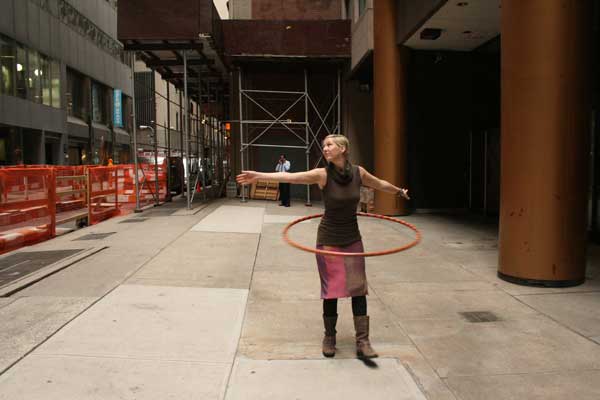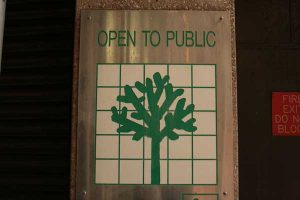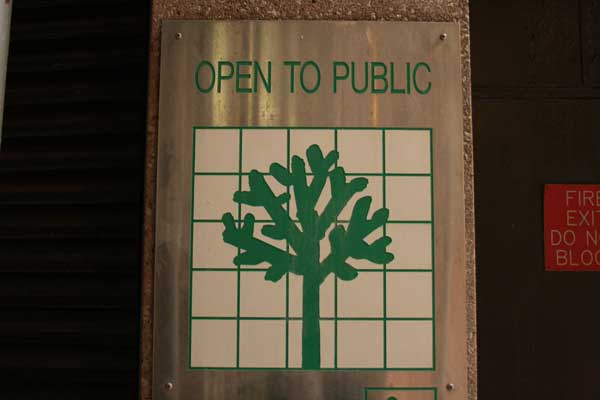
BY ALINE REYNOLDS| To quit smoking, Financial District worker Brooke Sweet took up hula-hooping during her work breaks in spring 2011.
Sweet, a data assistant at a mental health nonprofit at 50 Broadway, still hula-hoops 15 to 30 minutes a day in a plaza across from her building. “I thought I was being sneaky using private space for my own public use just to find out, ‘Wait a minute, I’m allowed to do this,’” she said.
Though the plaza is designated by the city as a privately owned public space (POP), it is currently void of all public amenities, including the necessary trees and benches required by city law. According to a Parks Department sign posted on the side of 40 Broad St. directly adjacent to the space, the plaza is supposed to have 64 linear feet of seating and three trees. The POP is one of approximately 50 such spaces in Lower Manhattan that the Municipal Arts Society of New York is hoping to publicize through a new digital resource, apops.mag.org.
The POP’s owner, 40 Broad Delaware, Inc., recently incurred several violations after an angry employee complained about the misuse of the space in mid-October. Per the inspection, “We found they were actually missing all required seating and three trees,” said Ryan FitzGibbon, a Dept. of Buildings spokesperson.
The requirements for the space date back to the early 1980s, when the city determined that the owners were entitled to 16,800 feet of bonus floor area so long as they established the area on New Street behind their building as an urban open space consisting of benches, planters and trees. However, when the city discovered that public amenities were missing from the POP in 1999 following a site visit, officials took the owner to court for not following the covenant.
[media-credit name=”DOWNTOWN EXPRESS” align=”alignleft” width=”300″] [/media-credit]Consequently, in late 2004, the company was slammed with a $28,000 fine for not complying with the law and was ordered by the State Supreme Court to install the necessary public amenities and to keep it open to the public 24 hours a day.
[/media-credit]Consequently, in late 2004, the company was slammed with a $28,000 fine for not complying with the law and was ordered by the State Supreme Court to install the necessary public amenities and to keep it open to the public 24 hours a day.
It is unclear to what degree and for how long the court order was obeyed. A spokesperson from Choice NY Management, which represents the owner, declined to comment for this story.
According to the book “Privately Owned Public Space: The New York City Experience” by urban planner and lawyer Jerold S. Kayden, the space effectively functions as a loading dock for car deliveries.
“The space had become an empty strip…no better than the street that it had so effectively countered,” the book reads. “No record of city approval that would permit removal of the required amenities or changes to the design of the space has been located.”
Meanwhile, Sweet has made calls to 311, the First Police Precinct and the building’s owner to no avail. Last month, she arranged a demonstration in the space that she named “hooping for a freer cause” in protest of the space’s misuse, where several hula- hoopers showed up to show their support.
“I’m frustrated because it’s not right,” she said. “It’s a public space, and I should be able to use it as should everyone else, and they need to hold up their end of the bargain.”
Sean King, who works at 40 Broad St. and stands in the POP while talking on his cell phone a few times a day, is also unhappy that the space doesn’t have the public amenities it is entitled to. Judging by the layout of the space, “I never knew this was a park,” he said. “If it’s going to be a park space, it should be used like a park — because it literally just seems like a freight area behind a building.
“Grass would be nice,” King added, “but considering it’s Lower Manhattan, that might be asking too much.”
Additionally, people have been illegally parking in the POP, according to area employees. King said he often sees vans unlawfully pull into the space. “There would be days where you’d come out and there would be like a line of five or six trucks,” he said.
At times, the parked vehicles have prevented Sweet from hula-hooping and have nearly hit her. “When cars are here, it’s a really hard thing for me to even use the space,” she said, “because my hoop can mar surfaces, so I have the potential to mess up their cars.”






























